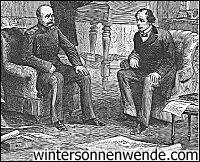 |
 George Henry Lane-Fox Pitt-Rivers Origin of the Czecho-Slovak Republic The state of Czecho-Slovakia came into existence on October 28th, 1918, as the result of the Czech cause being espoused by President Wilson at the Peace Conference, and after Great Britain had given recognition to the Czech legionaries, composed of prisoners of war and deserters from the Austro-Hungarian army, who had been formed into a Czech Legion in Russia. The Czech nationalist movement was first organized some twenty years before the War, and its influence was largely due to the efforts of the first Czech President, the late Thomas G. Masaryk, in America. During the War, these Austrian-Czech deserters were formed into a Czech battalion, which the British Government recognised in June 1918 as one of the White Russian and Allied forces in the war against Austro-Hungary and Germany, for which purpose they were equipped. On the collapse of the Austrian Empire, a Czecho-Slovak "National" Committee was encouraged by the Allies to proclaim itself a government in Prague and was afterwards recognised in the Treaty of Versailles. Before the end of 1917 nothing remained of Imperial Russia's war aims. No longer could she aspire to control Constantinople, the Bosphorus, and the Dardanelles, nor to annex Bukovina. No longer could her pre-war pan-Slav ambitions and intrigues serve to rally to her assistance her Czech and Slav Balkan allies, now that the Red standard of World Revolution had replaced the double-headed eagle in Moscow. Russia was defeated and her army broken before America would consent to join the Allies. Lenin accepted Germany's offer of an armistice and Russian delegates crossed the Russian lines. So Allied diplomacy and propaganda was directed in 1918 to preventing Russia being driven into the arms of Germany. Thus it came about that war aims had to be reconsidered, as it was time to liquidate Imperial Russia's aims which stood in the way of a separate peace with Turkey. The Bolshevik-internationalist destroyers of our war ally, Russia, and the Bolsheviki's powerful financial friends in the United States of America, who were subsidising world revolution as well as Czech and Serbian agitation, now had to be conciliated. At the same time, Mr. Lloyd George and his Foreign Secretary, Mr. Arthur Balfour, decided that it was necessary to counter the policy of those members of the British Government who were "inclined to take up a strong anti-Bolshevik attitude." Accordingly, the Prime Minister requested Mr. Balfour to draw up a Memorandum in which he embodied the new policy of "winning the goodwill of the present rulers of Petrograd" together with the new "war aims," which circular Memorandum of December 9th, 1917, was sent to members of the Cabinet. It was, according to Mr. Lloyd George, one of Mr. Balfour's "most notable State documents." In this Memorandum Mr. Balfour sets out:
It now became the keystone of British diplomatic policy to conciliate Mr. Trotsky and Mr. Litvinov, even though it was well known, as Mr. Lloyd George records, that:
Representatives of the Great Powers, who were signatories to the Treaty of London, dated September 4th, 1914, and the secret pact of April 26th, 1915, by which other powers adhered to it, now had to review their "war aims" in the light of a new balance of power. By this Treaty Great Britain, France and Russia had promised certain Austrian territories, inhabited by the Southern Slavs, to Italy. The Serbs, Croats and Slovenes took alarm at the prospect of the partition of Dalmatia by the victorious Allies, and under the leadership of Dr. Trumbitch, President of the Southern Slav Committee, and M. Pasich, Prime Minister of Serbia, assembled in Corfu, where, on June 2th, 1917, they issued a Southern Slav Unitary Declaration proclaiming the unity of the three peoples and claiming the territory inhabited by them. Thus it came about that the Great Powers, Great Britain, France, Russia and Italy, who were signatories to the 1914-1915 pacts of London, were obliged in 1918 "to proceed to the examination of the war aims and of the possible conditions of a just and durable peace in concert with Russia, as soon as a regular government, having the right to speak in the name of the nation, should be established in Russia."3
The main objective and aim of our propaganda department was to form a strong anti-German chain of Central European and Danubian states and to dismember the Austro-Hungarian Empire with the aid of the Czechs and the Southern Slavs. The difficulties of winning over the Southern Slavs to our rapid changes of policy and our new "war aims" were, as I have shown, their misgivings on the "Adriatic question." Nevertheless, the representatives of the Italian, and of the Yugo-Slav people in particular, found it politic to declare categorically at the Rome Congress that:
Amongst the principal points of the Memorandum on propaganda issued by the British Director of Propaganda in 1918 is found the following:
In reply to this Memorandum the British Foreign Secretary, Mr. Balfour, wrote:
It becomes quite clear, then, that the official British interpretation
of self-determination and freedom of subject nationalities was intended to mean
the permanent subjugation of German and Magyar peoples under the yoke of
Czechs and Serbs. For twenty years this propaganda, with these objects and aims
in view, under the specious cloak
of "self-determination" and "collective security," has been unrelentingly and
unremittingly pursued to the very brink of yet another world war, with the able
assistance and direction of such official expert Balkan propagandists as Messrs.
Wickham Steed and Seton-Watson, Masaryk Professor of the London University.
 In order to understand the long story of the conflicts and rivalries of the German, Magyar, and Slav peoples of the Austro-Hungarian Empire, which has been the arena in which the belligerent intervention of the Great Powers was taking place; and in order to understand the part played by international Jewry on this swift-moving and kaleidoscopic stage, we must go back in history at least as far as the Treaty of Berlin in 1878. In 1877 Bosnia-Herzegovina was emancipated from Turkish rule, whilst Bulgaria was about to emerge as an autonomous principality under Russia's protection but remaining a tributary under the suzerainty of the Sultan. At the same time Bosnia-Herzegovina was occupied and administered by Austria, though never formally annexed until the Austro-Turkish Convention of February, 1909. Thus these inflammable South-Slav provinces became and remained for sixty years the focal point of Central European power politics. Out of the Treaty of Berlin of the following year emerged also an independent Serbia and an independent Roumania. (Articles 34 and 43.) The confused and rapid changes in British foreign policy towards the German Empire and towards Germans, which is not the same thing, have for a century and more been intimately connected with the influence of European Jewry upon both Empires, and with the dramatic changes in Jewish allegiance that mass migrations and obscure movements in the financial world have brought about. These changes have been signalled in recent history, for example, by the Treaty of Berlin in 1878, after the Russo-Turkish war of 1877, whereby the interests of Jewry brought about an apparent rapprochement in the foreign policy of Great Britain and Germany. This event, however, at the same time marked the set-back to the pan-Slav and expansionist ambitions of Imperial Russia in the West, which dates from the first phase of a new era of power politics, whose precarious diplomatic equilibrium has since been so often disturbed and reversed by oscillations caused by hidden currents.
Apart from her enhanced prestige, England's material reward, Cyprus, she obtained secretly from the Turks, who were led to believe that, with Cyprus as a base, a philo-Turkish England would be in a better position to defend the Asiatic possessions of the Ottoman Empire against Russian designs directed towards Constantinople and the Dardanelles. The British plenipotentiaries at the Congress of Berlin were Disraeli, the Prime Minister, and his Foreign Secretary, Lord Salisbury. Thus was the long-time fuse lit which eventually detonated the Balkan powder magazine and threw Tzarist Russia into the arms of the French Republic. British opinion was particularly delighted when the news of England's Cypriot plum was made public; and when Disraeli returned from Berlin to London, proclaiming "Peace with Honour," he received the Order of the Garter at the hands of Queen Victoria. Mr. Wickham Steed's retrospective comments on this passage in the annals of British history, while consistent with his pan-Slav and anti-Austrian partisanship and sympathies, also provide food for reflection upon the rapid changes and reversals of foreign policy which alone are characteristic of British diplomacy. Referring to it in his Hapsburg Monarchy, he wrote:
Mr. Wickham Steed, indeed, supplies an explanation of German-Austrian policy which, it would appear, could even more forcibly be applied to British policy to account for its changes towards Germany and Austria, corresponding to the successive periods when Ashkenazic, or the German-Austrian-Polish-Russian wing of, Jewry exhibited pro-German or anti-German leanings. The theory which Mr. Wickham Steed puts forward he claims was in fact advanced to him by a learned Austrian Hebrew in order to explain the "pro-German tendencies displayed by the Ashkenazim Jews the world over." "German," he quotes this pundit as saying, "is the basis of our jargon, and next to Palestine, Germany is the country which we regard as our home. Hence our sentimental leaning towards Germany." Another less sentimental theory put forward by Mr. Steed of the former undoubted pro-German leanings of the Ashkenazim he summarises in the assertion that:
In 1871 the Anglo-Jewish Association was established. Its first president was
Jacob Waley, Professor of Political Economy at University College, London.
From its foundation the Association was prominent in ventilating the disabilities
and the interests of the Jewries of Russia, Roumania, Turkey, Persia, North Africa
and the Balkan States. Whenever a suitable occasion presented itself the
association sought the intervention of the Government in the interests of
international Jewry through the British Foreign Office. It was mainly through the
efforts of the Association that the Berlin Congress included clauses in the Treaty
safeguarding the political and civil liberties of the Jews of Roumania and Serbia.
This was the first time before Versailles that Jews were recognised by Treaty as a
National Minority. The credit for this has rightly been accorded by Jewry to the
influence of Disraeli, the British Prime Minister.7
|









